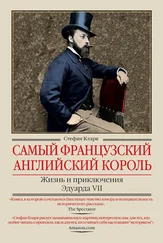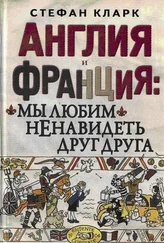Стефан Кларк - 1000 Years of Annoying the French
Здесь есть возможность читать онлайн «Стефан Кларк - 1000 Years of Annoying the French» весь текст электронной книги совершенно бесплатно (целиком полную версию без сокращений). В некоторых случаях можно слушать аудио, скачать через торрент в формате fb2 и присутствует краткое содержание. ISBN: , Издательство: Transworld Digital, Жанр: Старинная литература, на английском языке. Описание произведения, (предисловие) а так же отзывы посетителей доступны на портале библиотеки ЛибКат.
- Название:1000 Years of Annoying the French
- Автор:
- Издательство:Transworld Digital
- Жанр:
- Год:неизвестен
- ISBN:9781407067629
- Рейтинг книги:3 / 5. Голосов: 1
-
Избранное:Добавить в избранное
- Отзывы:
-
Ваша оценка:
- 60
- 1
- 2
- 3
- 4
- 5
1000 Years of Annoying the French: краткое содержание, описание и аннотация
Предлагаем к чтению аннотацию, описание, краткое содержание или предисловие (зависит от того, что написал сам автор книги «1000 Years of Annoying the French»). Если вы не нашли необходимую информацию о книге — напишите в комментариях, мы постараемся отыскать её.
1000 Years of Annoying the French — читать онлайн бесплатно полную книгу (весь текст) целиком
Ниже представлен текст книги, разбитый по страницам. Система сохранения места последней прочитанной страницы, позволяет с удобством читать онлайн бесплатно книгу «1000 Years of Annoying the French», без необходимости каждый раз заново искать на чём Вы остановились. Поставьте закладку, и сможете в любой момент перейти на страницу, на которой закончили чтение.
Интервал:
Закладка:
As we have already seen, the tapestry is open to a less pro-William interpretation than the one given by the present-day Normans in Bayeux – there is the reference to Harold as ‘Rex’, for example, and the heartrending scenes of Norman pillaging when they first land in England. As well as this, the tapestry shows Harold as a brave man, rescuing Normans from drowning near the Mont-Saint-Michel while he was William’s hostage, and depicts his coronation being performed by an archbishop, thereby giving it divine approval.
It has been suggested that this pro-Harold sentiment was put there by the Anglo-Saxon seamstresses, but there is strong evidence that the anti-Norman propaganda in the tapestry went much deeper than this.
One of the many books about the true origins of this mysterious work of art, Andrew Bridgeford’s 1066: The Hidden History of the Bayeux Tapestry , argues convincingly that the whole idea of the embroidery was to mount a subtle attack on William and the Normans. Bridgeford suggests that the tapestry was in fact commissioned by a disgruntled Frenchman called Eustace of Boulogne – the man mentioned above for leading an anti-William rebellion in Dover. Eustace had far more royal European blood in him than the ex-Viking William – he was a descendant of Charlemagne, the legendary King of the Franks who had reigned over much of France, Germany and Italy, and had also been married to Godgifu, the daughter of King Edward the Confessor. In theory, Eustace was therefore a prime candidate for the English throne, and was no doubt peeved that William had got his hands on it.
This, Bridgeford says, might explain why the tapestry’s captions refer to the invaders as ‘Franci’ – not only did Eustace want to underline the fact that William had non-Norman troops but he was also pointing the finger at his own Frankish ancestry. And talking of pointing fingers, the tapestry also depicts Eustace at the heart of the action during the Battle of Hastings, when he points to William as the Conqueror raises his helmet to show that he is still alive. Bridgeford suggests that this ingenious piece of pictorial sabotage was organized by Kentish monks (near Dover, where Eustace led his rebellion), and presented to Odo as a gift, supposedly flattering him and his royal brother, but in reality undermining their claim to be the rightful lords of England.
If this is true – and we will never be completely sure – the tapestry is like a bitter French laugh echoing down through the centuries. Only one fact is indisputable: William himself never got the joke, otherwise Eustace, the monks and the seamstresses would have been forced to eat the tapestry before having the lengths of cloth forcibly pulled out of their backsides and set on fire. William was that kind of guy.
Parlez-vous English?
Not everyone in eleventh-century England was completely anti-William. Even the sulking Anglo-Saxon chronicler had to admit that his reign hadn’t been all bad. ‘One must not forget the peace that he brought to this land,’ he says, ‘so that all men of property might travel safely throughout the kingdom.’ By building castles to keep the Anglo-Saxons under control, and having his troops on more or less permanent alert, William had imposed stability on the country, or at least on those parts of it that he didn’t trash completely. Once the initial massacring was over, life expectancy rose in England. True, taxes were high, especially for farmers unfortunate enough to have an absentee landlord as greedy as William’s brother Odo. But as we saw earlier, it was quite a relief to know that you might just survive long enough to bring in your harvest, even if you were going to give most of the income to a fat Norman bishop. And in the long term, England as a nation was a definite winner, because the Norman Conquest kick-started the culture that the French now mistakenly call ‘Anglo-Saxon’.
As of 1066, the invaders’ French-based dialect became the official language of conquered England, and it would be spoken by the Kings of England and all the ruling classes for the next 300 years or so. But the Anglo-Saxon peasants were too numerous and uneducated to have a new language imposed on them, and in any case the average Anglo-Saxon only ever used Franco-Norman words in order to sell his wares to a nobleman or beg a soldier not to castrate him for killing a hedgehog.
For their part, the conquerors generally refused or failed to learn the losers’ language (William tried and gave up). Amongst themselves the invaders developed a Franco-Norman pidgin that was a blend of their various regional dialects – a new patois that dispensed with many of the fiddly grammatical complexities that ‘pure’ French, the language of the Franks, would keep for centuries longer.
Gradually, as we will see in later chapters, Anglo-Saxon and Franco-Norman came into closer contact, and the linguistic survival techniques on both sides led to the emergence of a supple, adaptable language in which you could invent or half-borrow words and didn’t have to worry so much about whether your sentences had the right verb endings or respected certain strict rules of word order and style (as this sentence proves). The result was the earliest form of what would become English.
All of which goes to show that the Norman Conquest was as important linguistically as the moment when the first amphibians crawled out of the swamp and on to land. Anyone who has ever got bogged down in the mire of modern-day French grammar will appreciate how liberating English is. Jealous of our freedom, French grammarians will tell you that English is an impure, bastard language. They’re right, and the hilarious thing is, it owes its creation to William, a Norman bastard born on what is today French soil.
The beginning of the end (of the beginning)
All in all, then, far from being the triumph of France over England, the Norman Conquest was really bad news for the French. William’s invasion smashed the old Anglo-Saxon order, but founded a new nation that would outgrow its initial status as a Norman colony and become a fiercely independent force in Europe. What’s more, in doing so, William had deprived a deserving Frankish (French) candidate, Eustace of Boulogne, of the English throne.
As William lay dying in agony from wounds sustained in an anti-Parisian war, he would probably have gained some solace if he’d known that, in creating England, he had sown the seeds of a whole millennium of pain for the French.
Thanks to his Anglo-French parents, King Henry II of England already possessed Anjou and Normandy. And after he wooed away the French King’s landowning wife, Eleanor of Aquitaine, England could officially lord it over more than half of France.
1 Frenchmen don’t always remember a girl’s name, just her looks.
2 Although, of course, various European countries have been ruled by a fair number of bastards since.
3 Definitely not French, then.
4 Canute, as history books used to call him, was King of England from 1016 to 1035. A Dane, he left his mark on his adopted country by inventing the typically English habit of sitting on a beach in a deckchair and not noticing when the tide comes in.
5 When William later went off to conquer England, he created an even smellier job than leather-making: guarding the beached whales until he came home.
6 Although Harold’s army held the higher ground, so for them Hastings was actually a downhill battle.
7 Except for the very rare occasion when one of them was forced to spear an unsuspecting enemy from under a bridge, of course.
8 For the French, the half-Kenyan, part-Irish Barack Obama also became ‘Anglo-Saxon’ the minute he was elected President of the USA.
9 And culturally – snooty southerners allege – for several centuries longer.
Читать дальшеИнтервал:
Закладка:
Похожие книги на «1000 Years of Annoying the French»
Представляем Вашему вниманию похожие книги на «1000 Years of Annoying the French» списком для выбора. Мы отобрали схожую по названию и смыслу литературу в надежде предоставить читателям больше вариантов отыскать новые, интересные, ещё непрочитанные произведения.
Обсуждение, отзывы о книге «1000 Years of Annoying the French» и просто собственные мнения читателей. Оставьте ваши комментарии, напишите, что Вы думаете о произведении, его смысле или главных героях. Укажите что конкретно понравилось, а что нет, и почему Вы так считаете.












